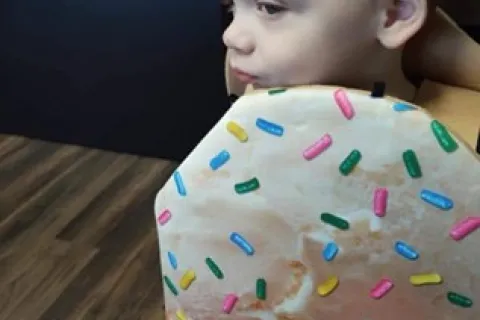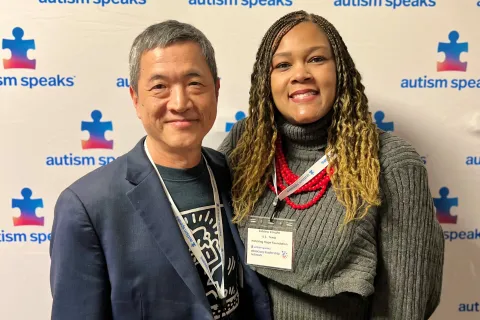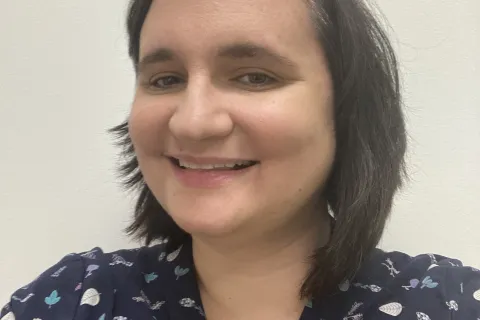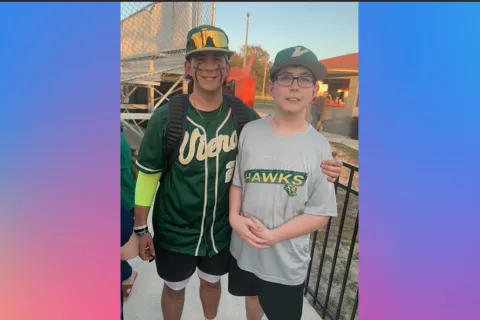What It’s Like to Have a Sibling with Autism
This guest post is from Natalie who has a younger brother on the spectrum. Natalie currently writes for AutismWorks Boston here.

Pat…
If you name a Beatle’s song, my brother will tell you the exact day, month and year it was released. He’ll even tell you what day of the week it was if you feel so inclined. In fact, this morning while I was eating breakfast, he matter-of-factly informed me that Justin Bieber shares a birthday with Roger Daltrey from The Who. He can recall any date regarding the smallest of occasions. If you ask him the last time we went to the antique store in Maine, he will tell you it was June 4th, 2001, a Thursday and it was raining, but he didn’t mind. The last time he ate shrimp was on a Wednesday, six years ago, and the weird texture and smell didn’t sit well with him. He will read ten pages of a book and then recite it back to you without skipping a beat. My brother has unique abilities unlike anyone I have ever met.
He is brilliant. He is priceless. His brain works in ways that mine never will. But he does not fit society’s “norm” and these amazing skills often go unappreciated. My brother has autism.
I have had a unique life. I grew up with a little brother whose needs were always more important than mine. Acceptance took longer than I wanted it to… strange looks when Pat acted out in public, the uncomfortable look on my friends’ faces when I decided (after months of internal debate) I would invite them over to play. Sometimes when a sibling has a disability you feel pressure to compensate for it. I wanted to be the best at everything and go above and beyond in every minute detail of my life. I was hyper aware of my dire need to succeed for as long as I can remember. I wanted to be the athlete I imagined my father longed for. I wanted to be the smartest student my mother would beam over – this was all self-provoked and not at all from my parents. I selfishly considered myself the only possible ‘proof’ that my parents were good parents and could raise ‘good’ children. Who else did they have? Who will take care of them someday? I realize now I could not have been more wrong.
To be the sister of a child with autism means every day is crazy and you never know what to expect. It’s stressful. It’s chaotic. You grow up very quickly. Whining about staying up later or wanting the newest phone seems completely insignificant when your sibling is struggling with basic life skills. You deal with a lot of emotions and anxieties that never cross the minds of other 8-years-olds. Why are those kids staring at my brother? What are they saying? Please stop flapping your arms. You hate your sibling, you love your sibling. It is overwhelming at first and that’s okay. You lose a lot - that trip to Disney would overwhelm him and your first violin concert might irritate his sensory issues. However, what you gain are irreplaceable life experiences that turn you into a strong, independent and caring adult who knows the true meaning of love, hard work, patience and family.
When I was little, the doctors said Pat would never speak. I wondered if my brother would ever be able to talk to me and tell me how he felt and why he cried and screamed. I wondered why we couldn’t leave the house without tears, even to go to the grocery store or why my mom was tying his shoes at ten years old. I didn’t understand why he didn’t respond when we screamed “Patrick!” over and over the day my mom asked me to watch him for two minutes and he wandered away. I wondered how many other six-year-olds had lost their brother before and if they understood the guilt. I wondered if he only knew me as the brown haired stick figure his therapist drew and labeled “Sister” in his book of words he would point to when he tried to say something. I wondered if he even knew I was his sister and what it meant to have a big sister. It means you always have someone looking out for you, worrying about you and wishing the best for you.
Then he proved everyone wrong and he spoke. I wondered if he would ever be able to tie his shoes, and when he learned how to tie his shoes, I wondered if he would ever be able to ride a bike. Pat now rides his bike all over the place all by himself. He volunteers at homeless shelters, the library and the hospital. He has made strides that could inspire anyone on their darkest days.

While there are a lot of things I don’t know, I do know that there is nothing Pat can’t do… He will face challenges we will never face but he can do anything. And if he lives with me for the rest of my life, I will be the luckiest big sister in the whole world to have every day blessed by the honesty, innocence and joy that someone with autism brings. Disabilities bring you back to the bare basics where being kind, helpful, patient and loving are the most important attributes.
People fear what they do not understand. Understanding is the key to acceptance; to understand that everyone is different and some people need extra help, extra time, extra attention and a little extra love. Understand that a disability does not give you the right to ever feel you are worthier than someone else. Autism exposes some tough, scary feelings. It forces you to reevaluate and abandon the life you may have envisioned and begin a new, untraveled, unplanned path. You don’t know where this path ends, but you just grab your family’s hands and head on down. My parents are the most amazing people I have ever met and with their love and dedication, Pat and I have grown into young adults with the utmost respect and gratitude for one another.
And to my brother, I love you more than words will ever be able to describe. I would not trade you for the anything. I would not change anything and I would go to the ends of the world for you. The struggles make us stronger. I am the luckiest girl in the world to have learned what life is genuinely about. It’s about love. Thank you.







